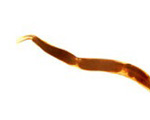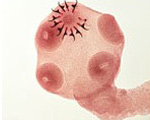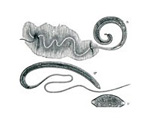Brought to you by Merck Animal Health
Dogs are often considered members of the family and it’s important to keep them healthy and free of intestinal parasites. Parasites are a threat to all dogs and outdoor dogs are especially vulnerable due to environmental exposure.
How dogs get parasites
It’s common for a dog to become infected with intestinal parasites at some point in their life. The more your dog is outside, the greater his risk of infection. Common sources of parasite infections include:
- Mom. Most puppies are born with worms they acquired either from their mother in utero or from nursing.
- The environment. Dogs may ingest infective eggs or immature worms in the environment, which can easily be picked up through the soil, from feces or, in some cases, through their skin.
- Ingestion of other animals. Worms are transmitted by hosts such as rodents that have consumed the infective stages and act as intermediate hosts.
Threat to humans
Worms aren’t just dangerous to the family dog. They also put people at risk, especially children. Infections in kids and adults happen accidentally by eating roundworm eggs.
Hookworms can cause disease in people too, most commonly they cause a skin irritation when the hookworm larvae enter the skin and migrate causing severe itching and painful tunnel-like rashes.
Preventing parasite infestations in dogs is not only important for the overall health of the dog, but also reduces human health risks associated with environmental contamination.
Get to know the major culprits
All dogs are susceptible to intestinal parasites and the best way to defend your dog against these parasites is to understand the most common threats impacting dogs in North America.
 |
 |
 |
 |
Roundworms
Toxocara canis
Toxascaris leonina |
Hookworms
Ancylostoma caninum
Uncinaria stenocephala |
Taenia tapeworm
Taenia pisiformis |
Whipworm
Trichuris vulpis |
- Acquired from mother and eggs in environment
- Almost all puppies are born infected
- Canine roundworm infections are zoonotic meaning they can be transmitted from animals to humans
|
- Acquired from mother and eggs or larvae in environment
- Eggs survive well in mild temperatures, shade and moist soil or grass
- Outdoor dogs are infected and re-infected by eating the worm eggs in the environment
- Canine hookworms are zoonotic
|
- Consist of a head from which a series of segments grow
- Outdoor dogs are infected when they ingest a host such as a rabbit or rodent harboring infective tapeworm larvae
|
- Infect not only dogs, but also wildlife such as foxes and coyotes
- Eggs are passed in the feces where they remain infectious for many years
- Not all dewormers are effective against whipworms
|
If your dog is showing these signs, it might be time for deworming.
- Poor stamina
- Diarrhea
- Weight loss
- Dry or dull haircoat
- General poor appearance
- Potbelly (in puppies)
Choosing the right dewormer
Regular deworming is essential to protecting the health of your dog. It’s important to select a dewormer that is not only effective against the four major parasites of outdoor dogs, but is also extremely safe.
Safe-Guard® (fenbendazole) Canine Dewormer is a safe and highly effective treatment for eliminating a variety of intestinal worms including six species of the four major parasites found in dogs that spend a lot of time outside, including whipworms and
Taenia tapeworms. Safe-Guard is the only broad-spectrum canine dewormer with no warnings or contra-indications.
Safe-Guard is safe for:
- Dogs of all breeds
- Puppies (at least 6 weeks of age)
- Pregnant females
- Older dogs
Consult your veterinarian
If you suspect your dog may have parasites, consider scheduling an exam and fecal test with your veterinarian. Worms are usually diagnosed by finding eggs when a stool sample is examined under a microscope.
By following your veterinarian’s recommendations and having your pet tested for parasites annually, you can protect your dog and your family from potentially harmful parasites all year long. For more information, visit
www.safe-guard-for-dogs.com.
Consult with your veterinarian for assistance in the diagnosis, treatment and control of parasitism.
Approximately 1% of dogs had vomiting associated with the use of this product. Safe-Guard® Canine Dewormer has no known drug interactions and is an ideal complement to monthly heartworm prevention products, which may not protect against all four major types of intestinal worms.

Dr. Madeleine Stahl is a graduate of the Purdue University College of Veterinary Medicine. After graduation, she practiced small animal medicine in New Jersey and Virginia. She currently is employed by Merck Animal Health as an Associate Director of Scientific Marketing Affairs and has a special interest in canine and feline infectious diseases.
Copyright © 2018 Intervet Inc., d/b/a Merck Animal Health, a subsidiary of Merck & Co., Inc.